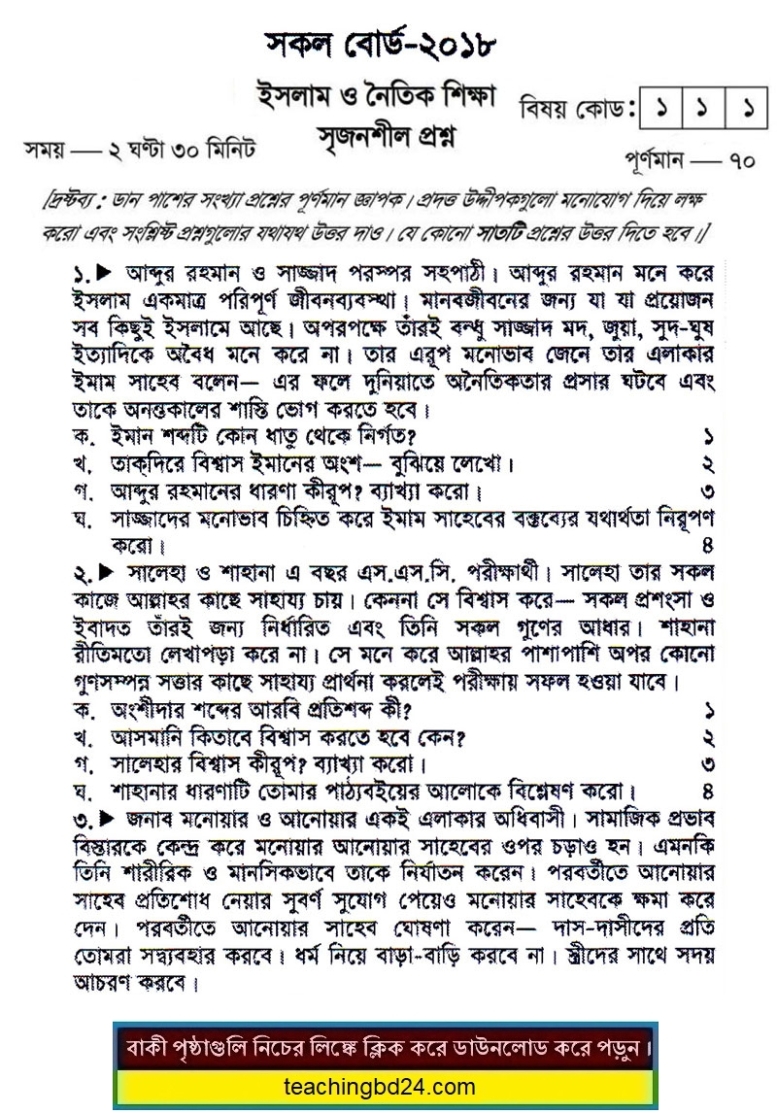SSC All Board Islam and moral Education Board Question 2018. Islam is a monotheistic and Abrahamic religion articulated by the Qur’an, a book considered by its adherents to be the verbatim word of God (Arabic: الله Allāh) and by the teachings and normative example (called the Sunnah and composed of hadith) of Muhammad, considered by them to be the last prophet of God. An adherent of Islam is called a Muslim.
Muslims believe that God is one and incomparable and the purpose of existence is to love and serve God. Muslims also believe that Islam is the complete and universal version of a primordial faith that was revealed at many times and places before, including through Abraham, Moses, and Jesus, whom they consider prophets. They maintain that the previous messages and revelations have been partially misinterpreted or altered over time, but consider the Arabic Qur’an to be both the unaltered and the final revelation of God.
SSC All Board Islam and moral Education Board Question 2018


Morality in Islam encompasses the concept of righteousness, good character, and the body of moral qualities and virtues prescribed in Islamic religious texts. The principle and fundamental purpose of Islamic morality is love: love for God and love for God’s creatures. The religious conception is that mankind will behave morally and treat each other in the best possible manner to please God.
Teachings on morality and moral conduct constitute a major part of Islamic literature. The Quran and the Hadith – the central religious texts of Islam – serve as the primary source for these teachings.[3] Both the Quran and the hadith often instruct Muslims to adopt a morally upright character. Showing kindness to people and charity to the poor and the helpless are the most emphasized moral virtues in the Quran. In particular, helping people their time of need, forgiving others’ offenses, respecting parents and elders, fulfilling promises, being kind to people and to animals, being patient in adversity, maintaining justice, being honest, and controlling one’s anger appears as major virtues in the Islamic concept of morality.
The Quran, which Muslims believe to be the verbatim word of God, serves as the primary source of moral teachings in Islam. The Sunnah, which is the teachings, deeds and sayings, silent permissions (or disapprovals) of the Islamic prophet Muhammad, as well as various reports about Muhammad’s companions, also serves as an important source for Islamic moral teachings. Besides these, the works of Islamic scholars and philosophers, and the moral examples set by important Islamic personalities (such as the four rightly guided caliphs) are other sources for Islamic ethical and moral guidance.
Islamic secondary sources and later Islamic scholarly works have made detailed discussions and laid down detailed instructions on moral issues. However, some general principles can be found in the case of the following morality. One typical Islamic teaching on morality is that imposing a penalty on an offender in proportion to their offense is permissible and just, but forgiving the offender is better.
To go one step further by offering a favor to the offender is regarded as the highest excellence. Another principle is that whatever is good and beneficial for mankind is morally good, and vice versa. According to Islamic sharia, a Muslim is expected to act only in good manners as bad manners earn vices. Muhammad is reported as saying “It is not possible that you indulge in rebuking and reviling and remain righteous at the same time”.
Religious concepts and practices include the five pillars of Islam, which are basic concepts and obligatory acts of worship, and following Islamic law, which touches on virtually every aspect of life and society, providing guidance on multifarious topics from banking and welfare, to warfare and the environment.
teachingbd24.com is such a website where you would get all kinds of necessary information regarding educational notes, suggestions and questions’ patterns of school, college, and madrasahs. Particularly you will get here special notes of physics that will be immensely useful to both students and teachers. The builder of the website is Mr. Md. Shah Jamal Who has been serving for 30 years as an Asst. Professor of BAF Shaheen College. He expects that this website will meet up all the needs of Bengali version learners /students. He has requested concerned both students and teachers to spread this website home and abroad.
Discover more from Teaching BD
Subscribe to get the latest posts sent to your email.


